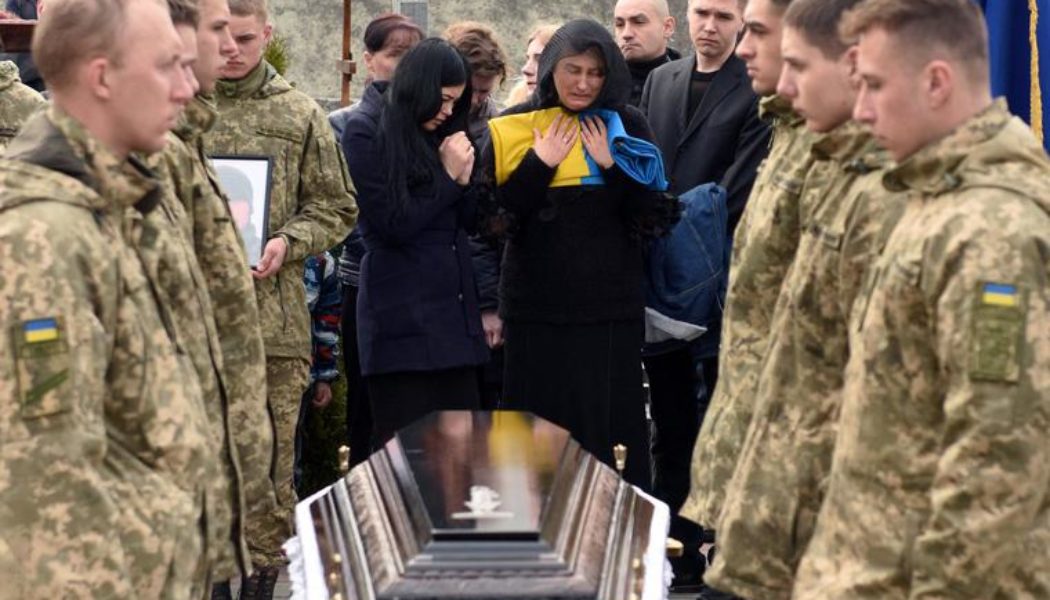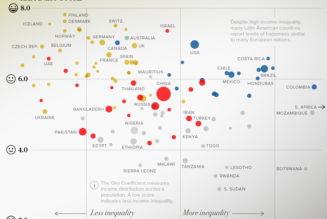
The war in Ukraine has awakened the world to the horrors of war and humanitarian plight. Attached to this “awakening” are deep questions of moral theology and Catholic social teaching. To assist our readers to navigate these questions, I reached out to Dr. Matthew Minerd, professor of philosophy and moral theology at the Byzantine Catholic Seminary of Sts. Cyril and Methodius in Pittsburgh. Dr. Minerd kindly submitted written responses to several questions. Below are our questions and answers:
As a moral theologian, could you give a brief overview of the Catholic social teaching on war? What are the basic elements of just war theory? And where does this teaching stem from in the Catholic theological tradition?
To be clear: The Catholic Church, not merely as a question of theological debate, nor by way of mere local synod or council, but indeed, in her role as universal mother and teacher, as the Universal Church of Christ, has taught and still teaches that in certain circumstances, the waging of a defensive war can be something that is morally legitimate; hence, even though war involves many evils, the delimited case of justified warfare does not imply the commission of sin. Although there have been developments in this domain of doctrine, and although segments of the early Church at times even held that combatants in just wars should still do penance after being tied up in such evils, the Church’s position is quite clear and constant.
It is fair to say, however, that the notion of “just war” developed most fully in the West, under the influence of St. Augustine (354–430), St. Thomas Aquinas (1225–1274), and then during the period of Baroque Scholasticism under the pens of, for example, the Dominican Francisco de Vitoria (1483–1546) and the Jesuit Francisco Suárez (1548–1617), though many others could be cited as well.
In his Summa theologiae, St. Thomas Aquinas places his discussion of war in a rather surprising place: the treatise on the theological virtue of charity. He does this because war is directly opposed to peace, which is one of the fruits of the divine love of charity. However, as certain later Thomists — for example, the great Dominican moral theologian Father Benoît-Henri Merkelbach (1871-1942) — noted, war should also be considered in terms of the virtue of justice, for it is concerned with the right that certain nations have to protect themselves in response to aggression exercised against them.
Following St. Thomas’s comments in ST II-II, q. 40, a. 1, Thomists note three conditions needed for rendering a war morally just: (1) declaration by civil authority (and not private citizens); (2) the existence of a proportionate and grave cause for the declaration of war; and (3) the presupposition that the nation claiming a just cause itself be intending a true and virtuous common good (as Father Merkelbach well summarizes it, “not out of hatred, nor vainglory, nor private desire for vengeance, nor out of a desire merely to do harm, nor a cruel intent to punish, nor a lust for domination, nor implacability of spirit … but out of love for the [true and virtuous] common good”).
The universal Catechism of the Catholic Church (2309) expresses further conditions, which can, however, be found in the long theological and philosophical tradition concerning just war theory: “(1) the damage inflicted by the aggressor on the nation or community of nations must be lasting, grave, and certain; (2) all other means of putting an end to it must have been shown to be impractical or ineffective; (3) there must be serious prospects of success; (4) the use of arms must not produce evils and disorders graver than the evil to be eliminated (the power of modern means of destruction weighs very heavily in evaluating this condition).”
It lays within the competence of political prudence — a true moral virtue that all political leaders should cultivate — to decide exactly when these conditions exist. Modern warfare makes such discernment very difficult. However, even in view of the changes of the modern world and of modern warfare, the Church does not hold that it is unjust for nations to defend themselves when they suffer unjust aggression.
Obviously, the war in Ukraine is on everyone’s mind. How does this conflict fit into the Catholic understanding of a just war? What are Catholics to make of the conflict?
Before answering this, I should state that, in a sense, I have personal ties to this conflict. As the descendent of Czech and Slovakian immigrants, I have a native love of the Slavic nations of Eastern Europe. Thus, too, I have an instinctive political distrust of Russia because of its long history of imperialism, whether Tsarist or Soviet. Moreover, I am a Ruthenian Catholic, with Ukrainian Catholic friends and colleagues, and my pastor comes from Transcarpathian Ukraine. The political and ecclesiastical aggression of the Russian Orthodox Church vis-à-vis Eastern Catholics and also against the Ukrainian Orthodox Church weighs heavily on my heart.
Now, I am not a practitioner of international politics. Therefore, I humbly submit my judgment to minds that are better informed in such affairs. Nonetheless, it seems quite clear on face value that Russia’s aggression against Ukraine represents an unjust imposition of force against a sovereign nation. Obviously, Ukraine has a long and varied relationship with Russia (whether Imperial or Soviet). However, the configuration of nations today is quite clear: Ukraine today exists as an autonomous, sovereign nation. None of the conditions mentioned above can be cited by Russia in justification of its attempt to annex a portion (or the whole) of Ukraine by force of war.
Even on the most benevolent reading, President Vladimir Putin seems to be echoing the claims made by Imperial Russia during the 19th-century debates over Pan-Slavic nationalism. According to him, Russia’s own national and cultural identity is tied up with that of Slavic Eastern Europe, which in his opinion risks being swallowed up by Western, liberal cosmopolitanism.
NATO’s continued concern regarding Russia seems, however, to have found quite clear justification precisely by the belligerent action of Putin’s government. The politics of diplomacy in Europe are complex and should be left for experts. Nonetheless, I believe it is Russian subterfuge to claim that Western Europe’s stance toward Russia justifies the view that NATO expansion is directly or indirectly an act of aggression. One only needs to think of Germany’s own involvement in Russian gas pipeline construction, a project that was brought to a halt only upon Russia’s own act of aggression. Such acceptance of energy dependence by Germany did not bespeak a universal, Western-NATO intransigence in relation to Russia. Thus, the response of NATO nations today is neither precipitous nor ill-founded, and Ukraine is quite justified in responding to unjust aggression by Russia.
Unfortunately, Putin’s claims, which have taken on several different forms these past few weeks, have been viewed either favorably, or at least plausibly, by some Christians in America. Merely because the Western liberal order is riddled with social and political problems, this does not justify looking to Moscow as though it were a Christian society standing erect against the acidic waves of modernity. Commentators who are better informed than I on such matters are clear that the appearances of conservative orthodoxy in Russia are not as culturally deep as some in the West think that they are. And it is shameful, in my opinion, that certain Catholic parties online have circulated a letter supposedly penned by Archbishop Carlo Maria Viganò containing appeals to Moscow as the “Third Rome” (language which is that of Imperial Russia and the unjust expansionism of the Moscow Patriarchate). The great temptation for most people in the U.S. is to reduce everything to the language of our culture war. The naivety of doing so on behalf of a supposed “reconstruction of a Christian civilization” against the “globalist techno-health transhuman monster” is a cynical and manipulative use of the fears of Christians.
I would add, likewise, that as things stand today, Catholics should view the position taken by the Russian Orthodox Patriarch, Kirill, as morally reprehensible. We must take great care not to judge our Russian Orthodox brothers and sisters. However, by publicly supporting an unjust war such as this, the Patriarch of Moscow deserves scorn from the Catholic and Orthodox world.
Now, what are we, as Catholics to do in response to all this?
Most of us, myself included, are not deeply involved in matters of international politics. Thus, while it is not wrong to make social media statements in support of the Ukrainian people, I am of the opinion that this is mostly wasted time (as is the case for most social media use). We should always focus on what, in our particular circumstances, is the most pressing duty that we have concerning such a matter of international conflict.
How blessed we are, as Catholics, to be in the midst of Lent, which reminds us of what our first duty is as Christians: prayer, fasting and almsgiving. Let’s be honest. Social media posts aren’t likely going to change anything in our close personal circles, let alone in international politics. But, if we believe, as we should, in the impetratory power of prayer and fasting, let us take up these two divine means with great faith.
Moreover, let us support the temporal needs of the Ukrainian people, especially civilians who are suffering. To this end, might I recommend that readers consider making donations through the Ruthenian Archeparchy of Pittsburgh or the Ukrainian Archeparchy of Philadelphia. I implore my [Latin Rite] brethren, who are so much wealthier than we Byzantine Catholics, to consider helping us in this matter, which hits so close to home for us, affecting our mother churches and people directly.
We’ve heard a lot about the U.S. and other nations providing weaponry and humanitarian aid to Ukraine, yet not committing any troops toward the conflict. How do we parse this in terms of moral theology? Obviously, providing humanitarian aid is a good thing but how is the distribution of weaponry justified in moral terms?
My first two answers were meant to lay out the central principles concerning these issues. For the last four questions, I’ll be briefer.
In the international community, there are many degrees of connection and assistance that are morally permissible (and in some cases clearly required). Nations must decide how to do so without haphazardly escalating aggression but, rather, as a means toward peace. Just as we sometimes must personally and directly participate in the justified self-defense of our neighbors, so too truly just nations must (remembering all due nuances) discern how they should aid in the just civic self-defense exercised by fellow nations. This requires great virtue on the part of leaders. Even if we have many reasons to be cynical, let us, instead, pray for those who wield such authority in our societies in the West.
We know that Russia and Ukraine have gone several times to the negotiation table over the past two weeks. What moral considerations are there when nations are negotiating for peace?
Negotiations for peace must, above all, respect the true rights of the aggrieved nation. Without such right order, a supposed peace is only a mockery thereof. Of course, this does not mean that aggrieved nations should intransigently hold their fellow negotiators hostage to endless requirements. Here, I think the position of Francisco de Vitoria, as summarized by Father Merkelbach, is a good guiding light:
The victor should not indeed declare the conditions of peace with the attitude of a victor or that of an accuser or a foe but, rather, as an equitable judge asserting the rights and merits of the case. The conditions that they must seek are those that will bring about the reestablishment of international order, namely, those of justice and cooperation, so that good relations between the victor and the defeated party might be possible.
Obviously, it is up to political prudence — again, this is a moral virtue that we must demand of our leaders — to determine the details of such an arrangement.
Pope Francis has been actively discussing the conflict and calling for a peaceful solution. What role does the Church have in being an intermediary for peace?
Obviously, the Church is the Mystical Body of Christ and not a kind of international NGO. Nonetheless, precisely because of her indirect, though real, authority over the political order, the Church has a particularly important role to play in the international community. Therefore, she has a role to play among the nations pursuing true peace. The popes of the 20th century bore witness to this fact with great clarity.
Finally, how does war fit into the grander scheme of Catholic moral theology? What moral lessons can the faithful take away from this experience?
Really, war represents a kind of failure, a wretched sort of sin, which must be studied within two particular domains of the broader practice of moral theology, namely those devoted to the virtues of charity and justice. It is one of the unfortunate facts of the Fall that this great and grave evil besets us. However, moral theology aims much higher: to explain to us how the gift of grace has extended to all of us the very possibility of living the divine life given to us in Christ.
I think, if anything, the moral theologian should end such remarks by making an appeal to all Catholics to engage more fully in evangelization, first and foremost locally but also, as appropriate to each person’s particular circumstances, more broadly throughout the world. We should not be shy: in Christ alone and in his Church will true peace be found. This is the very life we are all called to live, incorporated into his Body through the supernatural gift of grace. There will never be a perfect world before the final judgment. However, to the degree that it is possible, we must strive to bring the world the very peace that the world itself cannot give (John 14:27).
Matthew Minerd, Ph.D., is a professor of philosophy and moral theology at the Byzantine Catholic Seminary of Sts. Cyril and Methodius, as well as Holy Apostles College and Seminary. You can follow his work and browse his various books and articles at PhilosophicalCatholic.com.
Join Our Telegram Group : Salvation & Prosperity









